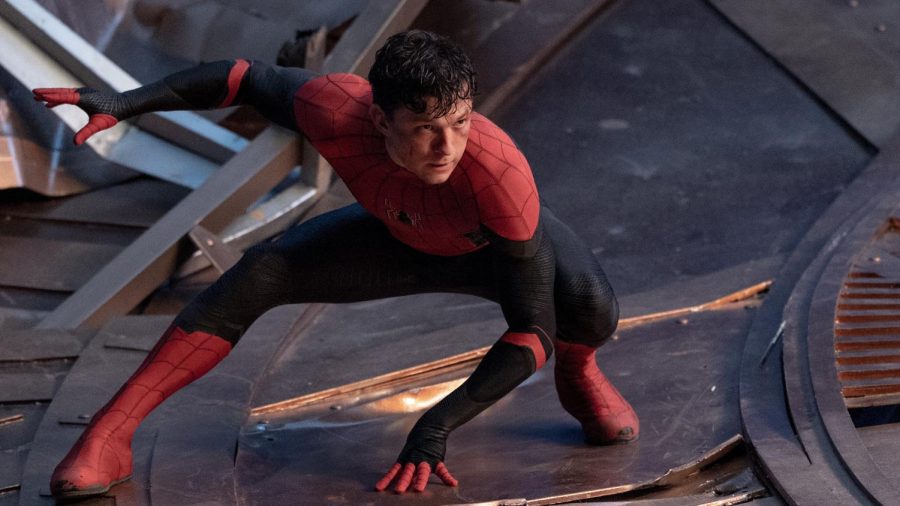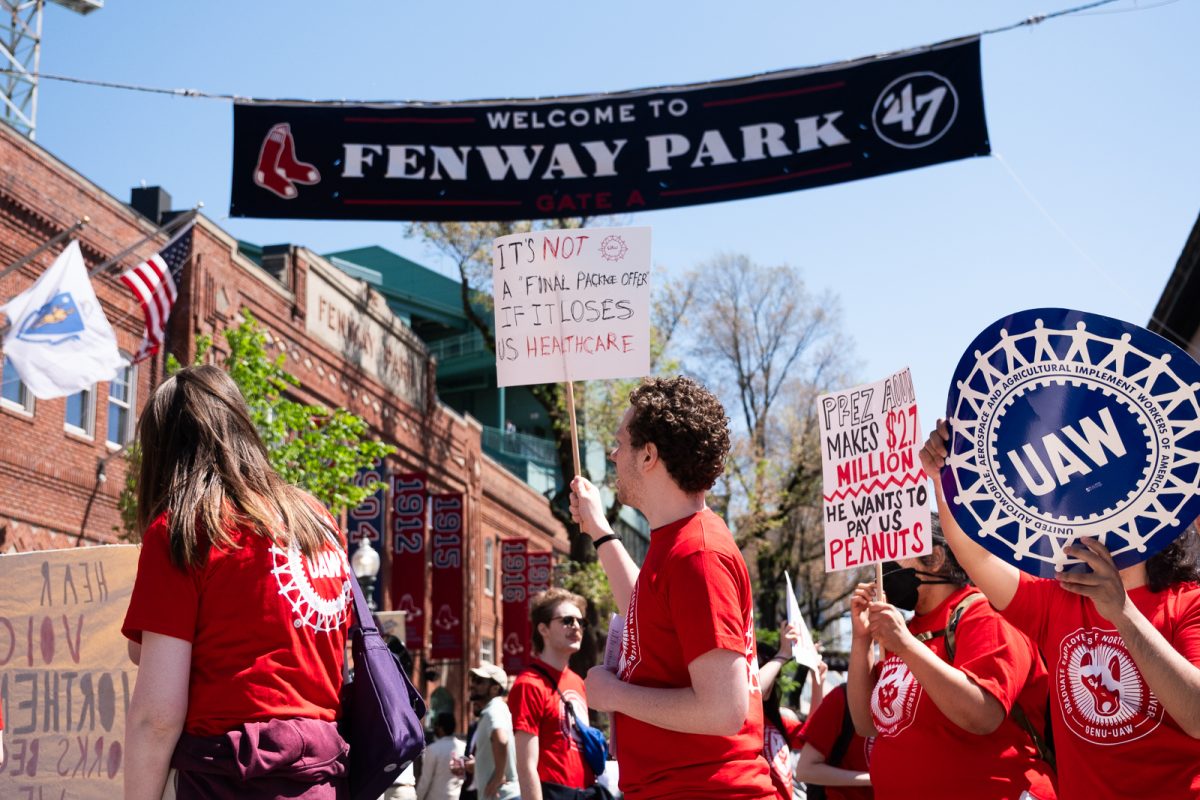Review: ‘Spider-Man: No Way Home’ brings the beloved superhero back to his roots
Tom Holland stars as Peter Parker/Spider-Man in Columbia Pictures’ SPIDER-MAN: NO WAY HOME. © 2012 Sony Pictures Digital Inc. All Rights Reserved.
January 4, 2022
The third and final act of Marvel Studios’ web-slinging superhero series, “Spider-Man: No Way Home” is the picture of Marvel at its best.
Fresh off Disney and Sony Pictures’ custody battle over the character in 2019, Spider-Man swung back into theaters Dec. 17 with an answer to the questions that Disney and Marvel Studios’ tumultuous ownership history left lingering. At just under two and a half hours, “No Way Home” is as much an antidote for anxious, eager fans as it is to criticisms of Marvel’s celebrity-packed, woefully chaotic superhero juggernaut.
Before the blossoming of Marvel’s film franchise, Sony Pictures put Marvel Comics’ Spider-Man on the silver screen twice. Actor Tobey Maguire first donned Peter Parker’s name and superhero likeness Spider-Man on-screen beginning in 2002, followed by Andrew Garfield’s rendition of the character in 2012.
When director Jon Watts took the helm of Marvel Studios’ try at the Spider-Man story in 2017, superhero newcomer Tom Holland immediately worked on carving out his own identity as Peter Parker.
Holland’s portrayal of the character thrived within Watts’ “Spider-Man” films that often resembled 1980s high school coming-of-age films more than they resembled their CGI-fest action peers in the Marvel film catalog. However, the young actor’s teenage Spider-Man was often lost in translation when the character appeared in Marvel’s Avengers projects against an ensemble of actors with greater legacies in Hollywood and within the Marvel film universe.
Within his own “Spider-Man” films, Holland has often had to juggle the rest of Marvel’s overlapping properties and resolve leftover plot holes and cliffhangers from more senior projects — think of the Spider-Man study-abroad sequel “Far from Home” (2019), which scrambled to explain the effects of the mass population disappearance of “Infinity War” (2018) and “Endgame” (2019), two large-scale Avengers films.
With growing whispers of Marvel’s “multiverse” of characters who span the Disney–Sony ownership divide and the reappearance of Maguire and Garfield’s predecessor Spider-Men, the hurdle for Holland to stand his ground as Spider-Man seemed higher than ever.
Marvel’s creative flaws and corporate entanglements trailed Peter Parker into the final installation of the “Spider-Man” trilogy. Yet for all of its cinematic shortcomings — occasional clunky self-referential dialogue and CGI of varying quality, for example — the franchise finale that audiences encountered was an unashamed love letter to the character, to the story and to the kinds of fans who crash movie ticket sites trying to get a seat at opening night.
Despite the weight of a multimillion-dollar franchise and the prophesied twin shadows of Maguire and Garfield, Holland finally came into his own over the course of the last chapter of his debut trilogy.
In “No Way Home,” the star-studded lineup of actors that previously drowned out Holland’s performances outside of the “Spider-Man” series, became the film’s saving grace. Performances from Jacob Batalon as Ned Leeds, Marisa Tomei as Peter’s Aunt May and actors Willem Dafoe and Alfred Molina who reprise their previous roles of Norman Osborn and Dr. Otto Octavius, respectively, brings a liveliness to “No Way Home” that is rare in Marvel’s industrial superhero movie catalogue.
Returning director Watts spares no cruelty for Peter Parker, putting the young protagonist through a physical and emotional battering that gives Holland the chance to show off his acting skills. Naïve, then disillusioned, beaten and bloody, Holland proves that he has grown right alongside Spider-Man.
The beating heart of Peter Parker’s story, Tomei’s Aunt May challenges Peter to redefine the terms of being a hero. In questioning the role of the superhero through Aunt May and in Watts’ unique genre identity for his “Spider-Man” films, “No Way Home” proposes a new question for Marvel’s filmmaking legacy as a whole: What is a superhero story, and who is it for?
Watts’ directorial stamp and the moral quandary of “No Way Home” articulate an ongoing phenomenon within the superhero blockbuster genre. High-brow Hollywood stars like director Martin Scorsese have rejected Marvel films from the “cinema” class. But newer Marvel directors, like Academy Award winners Taika Waititi and Chloé Zhao, have diverted from the cookie cutter, videogame-reminiscent styles of Marvel’s veteran directors Joseph and Anthony Russo by bringing their own auteurial voices into superhero filmmaking.
In “No Way Home,” Watts takes Peter and his friends through an anxiety-inducing college admissions meltdown, remaining true to the high school flick tone he set in the previous two installments. Even against Marvel’s franchise penchant for hurriedly concluding one climactic storyline and beginning another within a single film, Watts is determined not to stray from the “friendly neighborhood” authenticity that sets Spider-Man apart from other heroes across decades and adaptations.
After a dynasty of films that imagine superheroes as controversial celebrities, all approaching middle-age and hidden away in skyscrapers, the Spider-Man in “No Way Home” is as young, broke and Queens-based as ever. It is uniquely in tune with the wonders and woes of youth thanks to Holland’s fresh-faced performance and Watts’ careful coming-of-age direction. Peter Parker wants to go to college in Boston, and he wants to make sure he has the financial aid to afford it. He wants to spend time with his girlfriend and to shrug off the school bully. He wants to save the world, and he learns to bear the sacrifices that he must make to do that.
In “No Way Home,” Peter Parker trades the spaceships and celebrities of the prior Avengers films for his lousy New York walk-up, jumping out of his window in a handmade suit to go web-slinging through his city. Holland’s Spider-Man crashed onto the scene as a kid among a cast of Marvel giants, and slowly — and usually painfully — he found his way through an inverted classic origin story, an ode to the generations of Spider-Men before him.
At the end of the day, Holland’s Peter Parker, the star of Marvel’s most anticipated yet most intimate portrayal of a hero, is a kid from Queens with great power trying his best to take on his great responsibilities.







